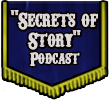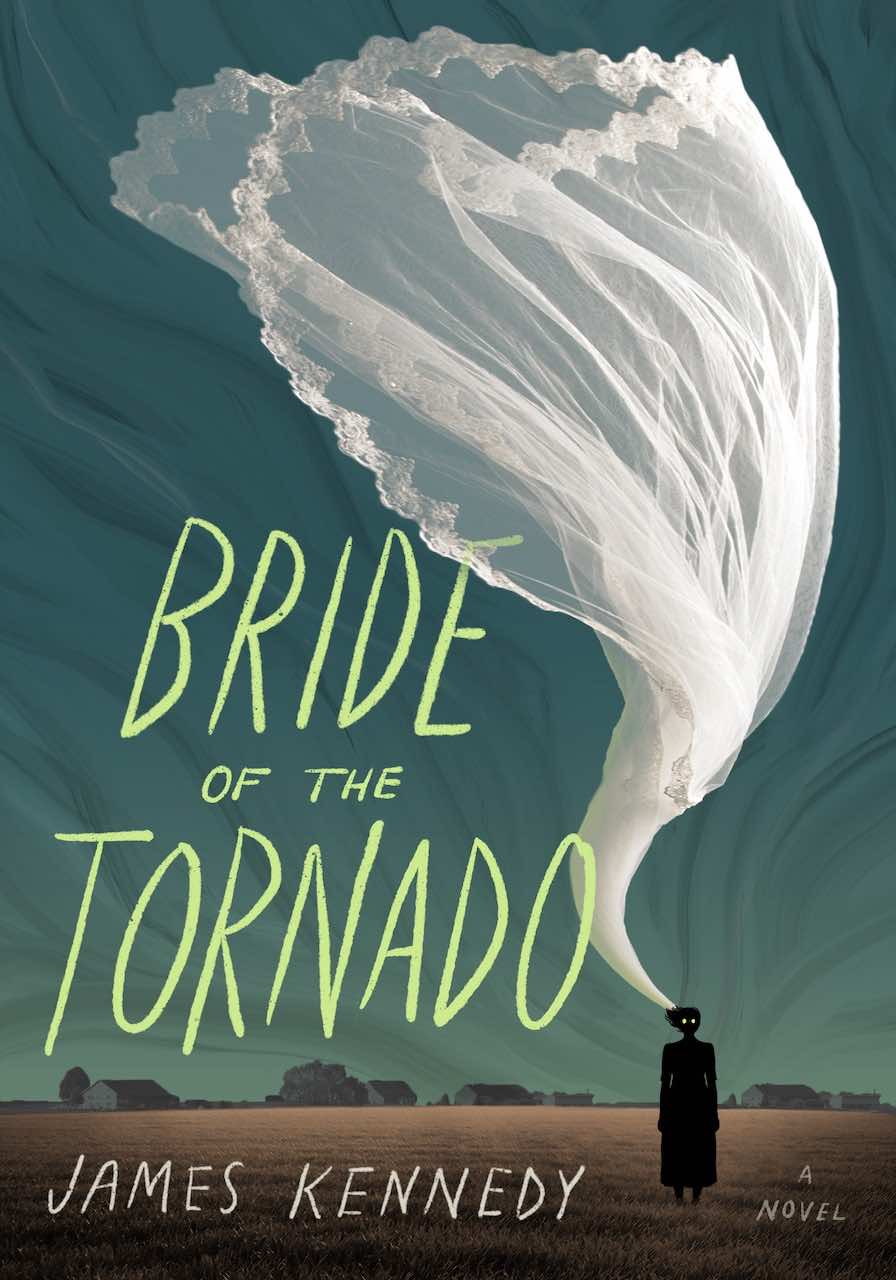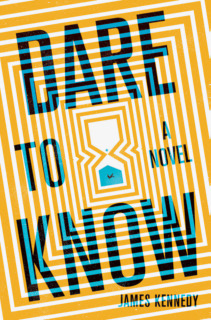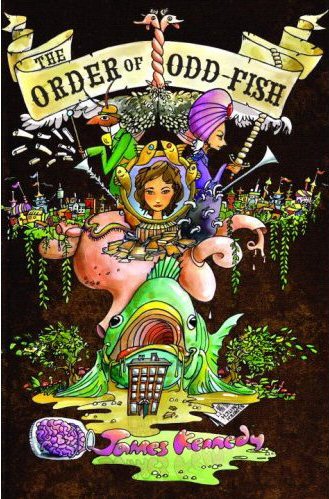The Secrets of Story Podcast With Matt Bird and James Kennedy
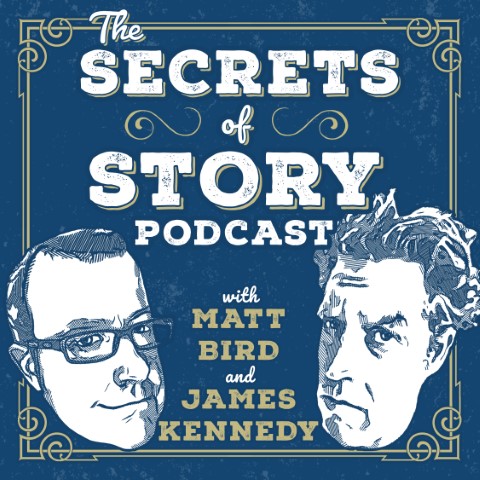
|
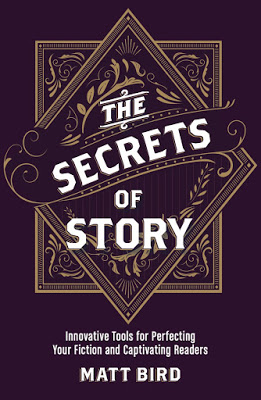 I co-host a podcast with Matt Bird, author of the screenwriting/novel-writing advice book The Secrets of Story: Innovative Tools for Perfecting Your Fiction and Captivating Readers.
I co-host a podcast with Matt Bird, author of the screenwriting/novel-writing advice book The Secrets of Story: Innovative Tools for Perfecting Your Fiction and Captivating Readers.
In each episode, Matt and I discuss some notion about storytelling craft. Sometimes we argue, sometimes we agree, sometimes we discover something new together. Subscribe to the Secrets of Story Podcast here.
For years I have been a fan of Matt’s storytelling advice blog, also called “Secrets of Story.” I’ve gleaned insights from it, recommended it to other writers, and used it for the writing classes I’ve taught. What I like about Matt’s advice is that it’s often counterintuitve, even iconoclastic, and I admire his cussedness even if I don’t always agree with him.
Here are all the episodes of the podcast, in chronological order. I update this page as new episodes become available.
Episode 1: When Does Perfectionism Hurt Creativity?
And how much can we rely on the audience’s goodwill? In a blog post called “Channel Master Thespian,” (referring to the old SNL Jon Lovitz character), Matt advises you not to imagine the best actors in the world performing your script, but rather the worst! That is, to make your script bulletproof, remove anything that could be characterized as “hammy.” I disagree, and try to persuade Matt that his kind of self-doubt and perfectionism leads to timid, defensive, unadventurous writing. This episode embodies the essence of Matt’s and my different approaches.
Read the listener comments in Matt’s post. I also posted about this episode.
Episode 2: Is Matt’s 14-Point Story Structure Accurate?
In this episode, we discuss Matt’s fourteen-point story structure and test it against the classic movie Silence of the Lambs. I disagree with how Matt characterizes a certain step in his structure, and far as I can tell, I bring Matt around to my point of view. You can read more deeply about Matt’s fourteen-point structure in this series of posts on his blog (the posts are in reverse chronological order, though, so scroll to the bottom and read from the bottom up).
Check out the listener discussion of this episode in Matt’s post and read my own take about this episode in my post.
Episode 3: Laika and the Blue Mouse
In an earlier episode, Matt outlined a story idea about Laika, the first dog in space, who was shot up there by the Russians in 1957. His idea: what if, instead of Laika dying in space in the Sputnik-2 as we all thought, she was scooped up by aliens? What adventures would result? To surprise Matt, I quickly wrote out a 75-page script based on this idea. In this episode Matt gives me notes on the script. Thanks to Freya and Theo for helping to perform the script. Warning: this episode is super-long! Matt encourages folks to skip it, but I think it’s a lot of fun.
It’s worth reading the lively discussion in the comment section of Matt’s post, and my post gives further background (and some good Laika images!)
Episode 4: Do Characters Really Need To Be “In Conflict” All The Time?
Matt and I clash about how contentious dialogue should be. Should characters always be motivated to “get something” out of the other character in the scene, and use tricks and traps to get it, as Matt advises? Or is there room for scenes in which characters are honestly trying to understand each other and care for each other, as I argue? Are most scenes—is life itself—really about a scramble for dominance? Or are there other models for behavior and storytelling?
To explore Matt’s point, we compare similar scenes from two different Star Trek movies. In both Star Trek: The Wrath of Khan (1982) and Star Trek: Beyond (2016), there’s a scene near the beginning of the movie in which Bones and Kirk share some alien drink on Kirk’s birthday, and Bones probes Kirk’s discomfort with growing old. (As it happens, we recorded this episode on the eve of my birthday, and we wound up drinking past midnight, so we were doing the same thing.)
Read our listeners’ comments about this episode in Matt’s post. And here’s my own post about Episode 4, complete with embedded videos of the two Star Trek scenes.
Episode 5: How Much Can You Switch The Point of View? (with guest Jonathan Auxier)
Matt and I had been quarreling about point of view in the comments sections of this post and this post on his blog. Basically, Matt thinks that too much switching point of view in a novel weakens it; I think the novel is a much more capacious form that he gives it credit for, and I bring up examples from beloved classics in which point of view switches in ways Matt has denigrated. In this episode, author Jonathan Auxier (Sophie Quire and the Last StoryGuard, The Night Gardener, Peter Nimble and His Fantastic Eyes) drops by to moderate the discussion and offer his own perspective.
Follow the listeners’ discussion of this episode in Matt’s post. And here is my own post about this episode.
Episode 6: Can Dan Harmon’s Story Circle Help You?
Matt invented a checklist that he uses as a tool to analyze story structure and to help writers find out what their broken stories might need. Famous showrunner Dan Harmon (creator of Community and Rick and Morty) has his own structure called the Story Circle. Here, we compare Matt’s checklist to Dan Harmon’s Story Circle by testing both frameworks against Raiders of the Lost Ark. Learn more about Dan Harmon’s storytelling theories here:
Story Structure 101: Super Basic Stuff
Story Structure 102: Pure Boring Theory
Story Structure 103: Simply Before Moving On
Story Structure 104: The Juicy Details
Story Structure 105: How TV is Different
Story Structure 106: Five Minute Pilots
In these two posts Dan goes even deeper into his storytelling methods using specific examples from his own work:
Could You Explain Your Story Breaking Process?
Could You Explain a particular Community episode?
Here is Matt’s post and my post about Episode 6.
Episode 7: How Can We Use OODA Loops In Storytelling?
I heard about a concept invented by some 1970s military person called “OODA Loops” (Observe-Orient-Decide-Act), a scheme that aims to clarify how people adjust to their environment and respond to it. It sounds obvious when it’s spelled out—basically, we’re all always going through a cycle in which we Observe the situation around us, Orient ourselves to it, Decide what to do, and Act on that decision. The military guy’s insight: if you have an adversary, they are going through their own OODA cycle at the same time. So your strategy should be, complete your OODA cycle faster than your adversary does—that’s what’s called “getting inside their OODA loop”—so that you can decide and act more quickly and with more agility than them. That way, they’re constantly adjusting to the new situations you’re creating. We discuss how this advice might be work for storytellers vis-a-vis the audience, or between characters in scenes, and even in politics.
Here is my post about Episode 7.
Episode 8: Do You Know About The Shadowy Structure Beyond The Hero’s Journey?
In this episode we explore alternative storytelling structures that go beyond the Hero’s Journey / Story Circle scheme. We talk about Boogie Nights, In Search of Lost Time, Brideshead Revisited, The Last Jedi, Beowulf, and other stories that aren’t so much about a hero solving a large problem, but rather about an old world passing away and getting supplanted by a new situation. I bring up the precursor and inspiration to Joseph Campbell, an amateur anthropologist named Lord Raglan (that is, “Fitzroy Richard Somerset, 4th Baron Raglan”). It looks like Joseph Campbell appropriated the first half of Lord Raglan’s hero archetype—about the rise of a hero—but Campbell discarded the other half of Lord Raglan’s structure, which is about the decline of the hero. A hidden second act to the well-known Hero’s Journey! A kind of shadow structure! What happens to the hero after they finish their journey? What is the story about the hero’s decline?
You can read more about the Rank-Raglan Mythotype here, and you can also read the vigorous discussion in the comments of Matt’s post. And here’s my post, which features a super-rare picture of me, Matt, and Lord Raglan himself.
Episode 9: Is A “Passive Protagonist” Really So Bad?
You always hear the advice, “Don’t have a passive main character! The hero of your story should always be active, pushing every scene forward, constantly making big decisions that affect the world around them!” And I guess that’s true . . . or is it? Some of the most famous characters from some of the most beloved stories are pretty passive! Consider Harry Potter, James from James and the Giant Peach, Chihiro from Spirited Away, Bella in Twilight, Charlie in Charlie and the Chocolate Factory, Meg in A Wrinkle in Time, Arthur Dent in The Hitch-hiker’s Guide to the Galaxy, Alice in Alice in Wonderland, or many others. These great characters are absolutely not taking the bull by the horns in every scene. In fact, I argue in this episode, these characters are passive by design. Their stories wouldn’t work as well if they were the active, ass-kicking, empowered heroes that misguided storytelling orthodoxy demands. A hero with too much agency is, in fact, alienating! I argue that the hero can be plenty passive at the beginning, as long as their agency increases throughout the story. Indeed there is something appealing about certain kinds of passivity! Matt disagrees at the beginning of the episode, but in the end I bring him around.
Read the comments in Matt’s post, and my post about Episode 9.
Episode 10: Jonathan Auxier Returns To Comment On The Last Three Episodes!
Author Jonathan Auxier returns to the podcast to give his thoughts about our last three episodes about OODA loops, the hidden back half of the hero’s journey, and my contention that passive heroes aren’t so bad. It’s probably best to listen to Episodes 7, 8, and 9 before listening to this episode.
Keep up with the listeners’ comments on this episode, and Matt’s further insights, in Matt’s post. I post about the episode here (with a spiffy graphic of Matt and I facing off, Mortal Kombat style).
Episode 11: Do Characters Really Always Act in “Self-Interest”?
This is the one in which Matt and I go for each other’s throats. Special guest Geoff Betts—Matt’s best friend from the old days—joins us to talk about the role of self-interest in characters. Matt has a piece of advice that I think that is totally wrongheaded, reductive, and depressing, which he summed up in his blog post Rule #42: People Only Want What They Want. Basically, Matt claims that characters are only really believable when they’re acting in their own self-interest. I think this is ludicrous, and that it doesn’t cover the full range of human motivation. Geoff is a union organizer, and he brings his own real-world perspective in how to motivate people through self-interest. He also provides a calming influence as Matt and I get more and more furious with each other . . . as the episode goes on, I feel Matt continually redefines “self-interest” is broader and more tortured ways so that it seems to pretty much covers every case. Come for the debate, and stay for my idea about a gender-flipped, age-flipped version of Annie, in which Annie is “Andy” (a 35-year-old Will-Ferrell-in-Elf-ish orphan), Daddy Warbucks is a Jojo-Siwa-esque instagrammer and influencer, and Grace is a take-no-crap J.K. Simmons type.
Here is Matt’s post about Episode 11.
Episode 12: How Do You Adapt Sci-Fi For Hollywood?
Matt and I discuss the book-to-movie adaptations of Jeff VanderMeer’s Annihilation as well Philip K. Dick’s short story Minority Report and his other short story We Can Remember It For You Wholesale (which was made into the movie Total Recall). Matt and I both love the novel Annihilation but agree that the movie doesn’t fully succeed. We completely disagree about Minority Report (I prefer the movie to the short story; Matt erroneously prefers the short story over the movie). But Matt and I come to agreement again about the gloriousness that is the 1990 Schwarezenegger version of Total Recall.
Read the listeners’ comments about this episode in Matt’s post, and check out my post to read further thoughts of mine about this episode (about how sometimes movies need a “game over, man!” character).
Episode 13: Can A Divine “Moment of Grace” Fix Your Climax?
Like many storytelling gurus, Matt says that a hero must be active and resourceful throughout a story, deploying pre-established skills to solve the crises the story throws at them. I agree . . . up to a point! Because I’ve noticed that in many stories, usually at the climax, there’s a certain moment in which those “works” of a hero are no longer effective, and the hero must instead rely on “grace.” Or sometimes the final test isn’t solved by the hero’s efforts, but rather an involuntary but essential property about the hero. In either case, it’s no longer the hero being active and resourceful that puts them over the finish line; rather, it’s something ineffable outside of their mere conscious efforts. I call this the “Moment of Grace,” and we discuss this claim in regards to Star Wars, Raiders of the Lost Ark, The Third Man, Toy Story, Harry Potter, Alien, Silence of the Lambs, The Graduate, and other movies and books.
It’s worth checking out the vigorous discussion about this episode in the comments section of Matt’s post about Episode 13.
Episode 14: Can Matt’s Old Story Idea Be Saved?
Matt brings up an idea he had years ago for a psychological thriller movie he calls Involuntary. I gave him some feedback, he wrote out the beats of the story, and we discuss his idea and try to refine it.
You can read the listeners’ comments in Matt’s post about Episode 14.
Episode 15: Should Novelists Follow Screenwriting Advice? (with guest Parker Peevyhouse)
We have a special guest appearance from novelist Parker Peevyhouse (Strange Exit, The Echo Room, and Where Futures End). She stops by with a juicy question: How much should novelists follow screenwriting advice? We’ve all heard about authors taking storytelling pointers from books like Blake Snyder’s Save the Cat or Syd Field’s Screenplay. How much does this fresh perspective help authors write better stories, and how much does it just make novels into crappy unproduced scripts?
Read the listeners’ comments about this episode in Matt’s post.
Episode 16: Should Your Hero Be Doing The Five Es?
I put on my Matt Bird hat and create my own crackpot system! I ask myself: what should the hero be doing in their first few crucial scenes to make the audience bond with them as quickly as possible? I offer a bunch of possible actions the hero can do to accomplish this. Alhough no hero does them all (nor should they! use these only a la carte), I find many successful protagonists doing these actions in many stories. I call the actions The Five Es: Eat (the hero eats or drinks something), Economic Activity (the hero buys, sells, trades, negotiates, deals with money in some way), Exercise (the hero engages in vigorous physical activity), Enjoy (the hero actually has fun), and Emulate (we see the hero pretend to be their best self). I also talk about how it pays off to isolate your hero every once in a while, and pitch the idea of including that in Matt’s Believe-Care-Invest system.
Read listener comments about this episode in Matt’s post.
Episode 17: Can You Handle Two More Es?
Immune to Matt’s mockery of my Five Es, I add two more Es to the mix: Explain (the hero demonstrates expertise in something) and Evaluate (the hero makes a judgement about the other characters around him). Will I be able to add even more Es in the future? Maybe!
Check out the illuminating listener discussion in the comments of Matt’s post about Episode 17.
Episode 18: What Makes for an “Insanely Great Ending”?
Michael Arndt, the Oscar-winning screenwriter of Little Miss Sunshine, Toy Story, and The Force Awakens, made an illuminating video called “Endings: The Good, the Bad, and the Insanely Great” in which he talks about what makes for a great ending for a movie. It’s 90 minutes, but it’s well worth your time! In it, he applies his theory to Star Wars, The Graduate, and his own Little Miss Sunshine. I recommend you watch Arndt’s video before you listen to this episode, but if you don’t have 90 minutes to spare, Matt and I do sum it up before we discuss it. We both found Arndt’s video insightful and helpful (and it also dovetails with my “Moment of Grace” from Episode 13) but I also found it misleading in one crucial way.
Read the listeners’ comments in Matt’s post about Episode 18.
Episode 19: What’s So Bad About Alienating the Audience?
There’s a lot of talk at the start of the episode about how we’ve joined the IFH podcasting network . . . but we’ve since left that network, so never mind! We discuss the premise of Matt’s new storytelling advice book he’s working on: that successful stories must make the audience Believe, Care, and Invest early on. That is, you must make the audience Believe in the reality of the character and the world through oddly specific details. Then make the audience Care for the hero by subjecting them to suffering, embarrassment, or humiliation (often tied to the hero’s flaw, but in an outsized way that’s out of proportion with what the hero deserves). And then you must make the audience Invest in the hero by demonstrating the hero is capable of solving the kind of problems the movie will throw at them. We dither about the title of Matt’s new book, discuss how good stories pull you in with one hand while they push you away with the other, and I add two more Es to my scheme: Encapsulate A Fantasy (the hero does something we could only dream of doing) and Engulfed With Emotion (we see the hero honestly overcome with enthusiastic passion for something). We discuss all this in relation to Lady Bird, Sideways, Selma, and more.
You can read the listener discussion of this episode here in Matt’s post.
Episode 20: Is Matt’s Scrapped Alan Turing Script Any Good?
Do writers lose something when they actually learn to write like a professional? To answer it, we delve into Matt’s tragic origin story. We spend this episode discussing his 2004 biopic-script about Alan Turing, The Man Who Won the War, and comparing it to the unrelated 2014 biopic about Alan Turing that actually got made, The Imitation Game. If you want to read his script, you can download it here but you can enjoy the episode just fine whether or not you do so.
Keep up with the listeners’ discussion of this episode in Matt’s post.
Episode 21: How Do You End A Long-Running Story? (with guest Jonathan Auxier)
Author Jonathan Auxier returns to talk about what makes the endings of long-running stories succeed or fail. People were mostly disappointed by the final episodes of Game of Thrones and Lost, as well as Star Wars: Rise of Skywalker. People got angry! They felt betrayed! On the other hand, most folks agree that Return of the Jedi and Lord of the Rings: Return of the King work. According to Jonathan, the endings of Harry Potter and Avengers: Engame . . . kind of work? We also talk about the endings of The Sopranos, Breaking Bad, Seinfeld, Buffy the Vampire Slayer, Twin Peaks, Battlestar Galactica, A Series of Unfortunate Events, the Indiana Jones trilogy, and the Toy Story trilogy. It’s a meaty episode!
After listening to the episode, check out the listener dicussion, as well as Matt’s and Jonathan’s follow-comments, here at Matt’s post.
Episode 22: What Is The “Holy Moment” Of Your Story?
Many stories have their origins in a sublime, overwhelming, pre-verbal initial image that is emblematic of the entire story, that encapsulates the worldview of the story, that galvanizes and sustains the artist, as well as entrancing the audience. After being busted down from that initial vision, the rest of the story, and the artist’s task, is about climbing back up to the original holy vision, to transform and redeem it. We discuss Hayao Miyazaki’s creative process, “reconfirming your starting points,” the opening credits of sitcoms, Narnia books, the Indiana Jones and James Bond movies, E.T., Star Wars, Jaws, Battlestar Galactica, Avatar: The Last Airbender, Aliens, Rushmore, Blue Velvet, The Incredibles, The Fugitive, Get Out, Casablanca, and Groundhog Day. You also find out how I almost got hit by a meteor, why I cried to my second-grade teacher “I’m never going to eat Raisin Bran again!”, and why Matt sings the praises of Minneapolis Community and Technical College.
Read listeners’ comments about Episode 22 in Matt’s post.
Episode 23: Should You Polarize Characters Into Head, Heart, and Gut?
Matt introduces his idea that the main characters in a story can often usefully be polarized into Head, Heart, and Gut. The Head is Spock, Princess Leia, and Hermione Granger: that is, the superego, the smartest character who lays down the law about proper behavior. The Heart is Dr. McCoy, Luke Skywalker, and Harry Potter: the ego, the emotional character who’s concerned by who’ll get hurt and whether something feels right. The Gut is Captain Kirk, Han Solo, and Ron Weasley: the id, the character who follows their impulses, who is hungry or horny or motivated by money. We follow this idea through all its permutations as we find it not only in Star Trek, Star Wars, and Harry Potter, but also in The Good Place, Ghostbusters, The Three Musketeers, Cheers, The Simpsons, The Wizard of Oz, House, Girls, Sex and the City, Deliverance, 30 Rock, Alien, Silence of the Lambs, How I Met Your Mother, and Frasier. We talk about extra developments like the emergence of the “Spirit” character, the further subdivision of “Gut” into Cocky, Groin, and Spleen, and the advanced technique of partial polarization (for example, characters who are head-gut, heart-head, etc.) as we see in Community and Avatar: The Last Airbender. I propose an addition to the three-way polarization of “The Crazy One” (like Murdock in The A-Team or Corey Feldman’s character in Stand By Me.)
Read listeners’ comments about the episode, and find links to Matt’s various posts on this topic, at Matt’s post here.
Episode 24: What Does It Really Mean For A Character To Have “Agency”? (with guest Parker Peevyhouse)
Author Parker Peevyhouse returns to the podcast to talk about character agency. What does it really mean for a character to have agency? Is it possible for a character to have too much agency? Parker complicates and enriches the idea of “agency” beyond mere brash ass-kicking to include more sneaky kinds of agency, like steadfastly refusing to do what others demand of them—like Marta in Knives Out. How does character agency relate to the a character changing their philosophy of life? We discuss these issues in relation to The Hobbit, Lord of the Rings, Harry Potter, The Mandalorian, Iron Man, Doctor Strange, Rushmore, Antigone, and Jane Austen novels, as well as an extended discussion about Parker’s new book Strange Exit. We discuss how a character’s personal rules of conduct function as “potential energy” in a story, why Parker and I find superhero movies boring, and the dynamics of social stories vs. action stories.
We discuss this blog post of Matt’s a bit, about a character having a false philosophy vs. a corrected philosophy. Follow the listeners’ comments on Matt’s post.
Episode 25: What Can Storytellers Learn From Cult Leaders?
My latest hot take: novelists and screenwriters can learn a lot from cult leaders . . . and we can harness the dark arts of brainwashing to write better stories! Along the way, Matt and I recover repressed memories about our own experiences with cults. This episode refers to a video essay “How Midsommar Brainwashes You” by a YouTuber called “Acolytes of Horror,” which I recommend. Along the way I cobble together the 14 steps of brainwashing:
Recruit the target
1. Find a vulnerable target
2. Invite the target to an innocuous event
Break down the target’s identity/self
3. Cut the target off from outside influences
4. “Lovebomb” the target; dangle the Prize in front of the target
5. Extract an agreement from the target that they want the prize
Exhaust the target with stress
6. Shut down dissent by threatening to withhold the prize, iterating between carrot and stick
7. Arouse guilt in target and lead them to self-betrayal
8. Bring the target to a breaking point
9. Offer leniency and clear steps to make things right: compulsion of confession, channeling of guilt, action to be done
Worship together / full communion
10. Release of guilt through ritual or signficicant act
11. Progress and harmony
12. Final confession and rebirth into new community and identity
Read the listeners’ discussion about this episode in Matt’s post.
Episode 26: Can The Eight Character Wheel Help You? (with guest Lou Anders)
Author Lou Anders (the Thrones and Bones trilogy, Once Upon a Unicorn, and Star Wars: Flight of the Falcon) drops by to offer his own system of how to polarize characters. Matt’s system classifies characters as head, heart or gut (or permutations thereof); Lou’s alternative system separates characters into four pairs: protagonist / antagonist, mentor / bad example, true believer / skeptic, and thinker / feeler. He illustrates with examples from Star Wars, Big Hero Six, and Avengers, and we test out his theories on Harry Potter and Raiders of the Lost Ark.
Follow the discussion about this episode in Matt’s post.
Episode 27: Does A Hero Pass Throuogh Four Stages: Orphan, Wanderer, Warrior, Martyr? (with guest Lou Anders)
Author Lou Anders (the Thrones and Bones trilogy, Once Upon a Unicorn, and Star Wars: Flight of the Falcon) returns to give us further details about his theory of storytelling. In this episode, he explains how the hero in a story passes through four stages: Orphan, Wanderer, Warrior, and Martyr. Will Matt and I buy it? Also Lou tells a ghost story about when he was living at James Thurber’s old house!
Follow the discussion about this episode in Matt’s post.
Episode 28: Does The Order of Odd-Fish Follow Matt Bird’s Rules?
Does my own young adult fantasy novel The Order of Odd-Fish follow fulfill Matt’s storytelling rules? We consider the book in light of the episodes we’ve done so far. Does it pass the Believe-Care-Invest test? How about the 10 Es? Are the characters polarized? Is there a “Holy Moment”? How much should you care about these rules while writing your first draft? (Hint: you should ignore them!)
Find more information about this episode, including the charts we mention, in my post.
Episode 29: When Do You Write For Yourself? When For The Story? When For The Audience? (with guest Jonathan Auxier)
Kidlit author Jonathan Auxier (The Night Gardener, Sweep, the new Fabled Stables series, and more) returns for a fourth time to describe his insight that you go through three distinct stages of writing a story: first you’re writing to please yourself (the “author draft”), then you’re revising to perfect the story itself (the “artifact draft”), and finally you’re revising to take the audience’s reactions and sensibilities into account (the “audience draft”). Matt and I love this idea, and we tease out its implications. What if you do the steps in a different order? What if you’re giving/getting notes appropriate to one stage when the process is in a different stage? Jonathan’s a smart cookie, and always worth listening to.
Find more information about this episode, and to join the discussion, check out Matt’s post.
Episode 30: What Do We Really Mean By “Genre”? (with guest Jonathan Auxier)
Our guest on the last episode, children’s author Jonathan Auxier, got off on a lengthy tangent. We had to cut it for time, but then we decided to make that tangent its own episode! Here, Jonathan explains his insightful metaphor about how genre is “like hamburgers.” It goes to some interesting places! Along the way we apply his idea to Alien, Sweeney Todd, and more. Towards the end I talk about the connections between Stravinsky’s “Rite of Spring” and the soundtracks to Alien and Star Wars.
Episode 31: How Does Irony Work In Stories?
Matt believes irony is an essential element of all storytelling, and I agree, but what do we really mean when we say “irony”? Matt lays out with precision his theories of how to use irony effectively in your storytelling, and we talk about his ideas in the context of Casablanca, Blazing Saddles, and Mulan.
Find more information about this episode, and to join the discussion, check out Matt’s post.
Episode 32: How Should You Give (And Receive) Notes?
Matt and I talk about how to give “notes” on someone else’s writing (that is, helpful criticism) graciously and effectively; and how to accept those “notes,” even if they make you feel weird. The uncomfortable issue simmering in the background of this conversation is the fact that Matt and I have, as Matt admits in his blog post about this episode, “a contentious history of giving (or not giving) feedback to each other, and we reveal some big philosophical differences on the fraught topic of how to give and receive notes.” It’s a good episode!
Episode 33: How Do Today’s “Nice” Shows Change The Rules?
Back in Episode 4, I bemoaned how most of the “Golden Age of TV” shows, like Game of Thrones, Breaking Bad, The Walking Dead, and so on, had a similarly dour worldview: that the world is a relentless place consisting of the dominators and the dominated, that you’re a sucker to place your faith in other people’s better nature, etc. I predicted that the worm would turn, and that soon we would start getting shows that were more hopeful: stories in which people cooperate, and want the best for each other, in which villains can be redeemed, in which there is something in human interaction that is beyond rituals of domination and submission.
Well, I nailed it, didn’t I? Whether it’s Ted Lasso or Schitt’s Creek or Stephen Universe or She-Ra, the cultural mood has certainly shifted. But here’s the problem: most of Matt’s storytelling rules were forged in the smithy of that previous era. Which of those storytelling rules might feel misguided now? And what are some of the characteristics, strengths, and even weaknesses of today’s “nice” shows?
Matt posts about the episode here, with a good discussion in the comments section.
Episode 34: How Do You Build A Character’s Voice?
Matt and I discuss how to bring a character alive and make them vividly distinct from your other characters, all using the tools of Metaphor Families, Default Personality Traits, and Default Argument Tactics.
Follow the discussion about this episode in Matt’s post.
Episode 35: How Can Co-Writing Help You?
Matt and I host guest authors Keir Graff and Linda Joffe Hull, who have co-written several books together under their combined pen name “Linda Keir,” including their steamy thriller about swingers, The Swing of Things. How can writing with a partner unlock your creativity? What are the advantages and disadvantages and best practices? And is Matt correct when he says audiences long to see certain kinds of “transgression” be “punished” in stories? (He is not.)
Follow the discussion about this episode in Matt’s post.
Episode 36: Is Save The Cat! Any Good?
It’s our first international episode! The plan was for Matt and I to discuss Blake Snyder’s pernicious—and mysteriously successful—Save the Cat! writing advice books with Brits Sophie Beal (the co-director and founder of Cadence Publishing) and Gary Dalkin, senior associate editor at Cadence and freelance editor at To The Last Word. We intended to hash out the merits of Blake Snyder’s advice, but the conversation often went off into other topics. If you’re looking for the definitive takedown of Save the Cat!, this ain’t it, but Matt and I enjoyed talking to Gary and Sophie about all things writerly.
Matt posts about the episode here, and I post about it (with one of my trademark kooky graphics) here.
Episode 37:Is Craft in the Real World Helpful?
Matt and I discuss Matthew Salesses’ book Craft in the Real World: Rethinking Fiction Writing and Workshopping. I don’t have much experience with creative writing programs or “workshopping,” but Salesses’ book is full of original, necessary, contentious, pungent points about diversity in creative writing, alternative structures for storytelling, what “storytelling craft” really means, and more. Matt and I grapple with Salesses’ claims, hopefully productively!
Follow the discussion of this episode on Matt’s blog here.
Episode 38: Can AI analyze stories as well as Matt?
Matt took a job at Facebook in which he was supposed to teach their artificial intelligence how to be a dungeon master. That didn’t pan out, but along the way Matt also tried to teach Facebook’s AI how to analyze movies the Matt Bird Way, using his exhaustive checklist. Is the AI up to the task? What’s the future for AI and creative writing anyway? Matt and I hash it out.
Read more in Matt’s post about the episode here.
Episode 39: How Do You Get An Agent?
Matt and I discuss the burning question most writers have when starting out: How does one get represented? Matt and I love our current agents. But for both of us, it was a long and winding road getting repped. You’ll find lots of helpful hints for the unagented!
Read more about the episode in my post here.
Episode 40: Are “Mackendrick’s 41 Rules” Actually Useful for Storytellers? (Part 1 of 3)
Filmmaker Alexander Mackendrick (The Man in the White Suit, The Ladykillers, Sweet Smell of Success) finished out his career teaching at Cal Arts, and his advice was famously boiled down to 41 rules for storytellers. In the first part of three, Matt and I discuss which of these rules are useful, which are wrong, and which might be obsolete. How are these rules that were made for filmmakers in the 1940s applicable in our streaming era? Come to think of it, why should the rules in Aristotle’s Poetics still work when the kinds of dramas he’s basing his rules on don’t substantially exist anymore?
Read more about the episode in Matt’s blog post here.
Episode 41: Are “Mackendrick’s 41 Rules” Actually Useful for Storytellers? (Part 2 of 3)
Part two of three of the series in which Matt and I dissect the “41 Rules” attributed to filmmaker Alexander Mackendrick, and try to figure how they’re still applicable today (or not applicable). A special bonus: Matt showcases his theory about how Pulp Fiction is actually an Arthurian tale!
Read more about the episode in Matt’s blog post here.
Episode 42: Are “Mackendrick’s 41 Rules” Actually Useful for Storytellers? (Part 3 of 3)
The third and final part of our “Mackendrick’s 41 Rules” series. Which of this advice is helpful, which of it is mere common sense, and which of it is poisonous? Matt and I lurch and slump our way to our conclusions at last.
Read more about the episode in Matt’s blog post here.
Episode 43: How Can You Make Yourself Write Every Day? (With guest Brock Swinson)
Matt and I sit down with Brock Swinson of the Creative Principles Podcast and discuss his book Ink By The Barrel (freely downloadable here) which aims to help writers be more productive. Is it helpful?
Matt posts about the episode on his blog here.
Episode 44: How Did The Secrets of Story Help Torrey Maldonado? (with guest Torrey Maldonado)
Matt and I talk to acclaimed kids’ novelist Torrey Maldonado (Hands, What Lane?, Tight, and Secret Saturdays) and learn how he uses Matt’s advice to craft better novels while still keeping his authenticity and without becoming a mechanical handbook-follower.
Matt blogs about the episode here.
Episode 45: When Should You Be Specific, And When Should You Be Archetypal?
Standard storytelling advice says you should always be as specific as possible, but is that really true? What is gained when details are left out, when things are left vague, when one opts for a more archetypal vibe? Matt and I discuss the advantages and disadvantages of specificity in relation to my new novel Bride of the Tornado as well as his memoir-in-progress, as well as in the work of David Lynch, Grady Hendrix, Tim Burton, Dan Santat, and more.
Matt blogs about the episode here, and there’s a small discussion too.
Episode 46: How Do You Get From A Chaotic First Draft to A Final Draft? (with guests Gary Dalkin and Sophie Beal)
Previous guests Gary Dalkin and Sophie Beal stop by to discuss novelists’ relationship with editors, whether freelance or at a publisher. All four of us have been on one side of that divide or another, and most of us more than one! Today’s focus: what are the best practices of taking that messy, baggy, embarrassing first draft and revising it into something publishable?
Matt blogs about the episode here.
Episode 47: What is the “Heroine’s Labyrinth”? (with guest Douglas A. Burton)
Matt and I host author Douglas A. Burton, who wrote a provocative and useful book about storytelling structure called The Heroine’s Labyrinth. How are the stories of Little Red Riding Hood, Dorothy Gale, Buffy the Vampire Slayer, Clarice Starling, and Bella Swan different than the “hero’s journey” stories of Luke Skywalker, Indiana Jones, Conan the Barbarian, and such? (And to be clear, a “hero’s journey” story can have a female protagonist, and a “heroine’s labyrinth” story can have a male protagonist; these are just the names of structures.) I recommend Doug’s book! He makes a lot of bold, specific claims about what constitutes a Heroine’s Labyrinth story, and there’s lots of “news you can use” for writers.
I blog about the episode here.
Episode 48: How Do You Capture the Nature of Childhood? (with guest Betsy Bird)
It’s our first live episode, recorded at the Book Stall bookstore in Winnetka, IL, with a live audience mostly of folks from the North Shore SCBWI (Society of Children’s Books Writers and Illustators). Our guest is Betsy Bird (Matt’s wife, and a children’s librarian, famous blogger, and author in her own right). Here Matt, Betsy, and I discuss different techniques of how to represent the experience of childhood in writing. Lots of hot takes here: Beverly Cleary isn’t on Ramona’s side, Diary of a Wimpy Kid is a multivalent text of unexpected sophistication, and kids nowadays don’t like “problematic” kid protagonists like Harriet the Spy the way they used to. This one’s a banger!
I blog about the episode (with a snappy graphic!) here.
Hungry For More James Kennedy-Matt Bird content?
I did a series of guest posts on Matt’s “Secrets of Story” blog about the techniques Star Wars employs to convince us Luke Skywalker is a hero worthy of confidence, and not “whiny” as some critics characterize him. Here is part 1, part 2, part 3, and a final tangent.






